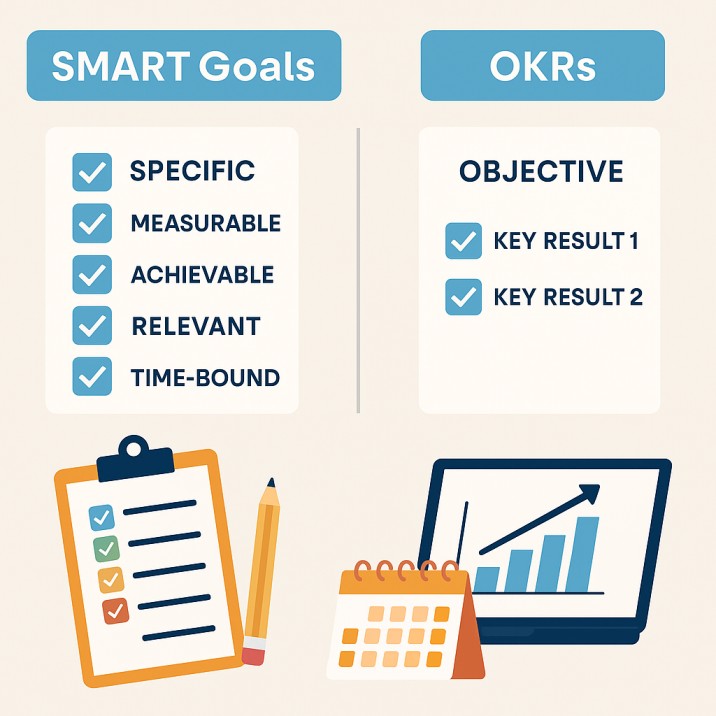Choosing the Right Goal Planning Method:
Setting goals is essential to business success. But the method you use can make all the difference. Two of the most popular frameworks are SMART Goals and OKRs (Objectives and Key Results). While they serve similar purposes, they are used differently depending on organizational structure, team size, and end objectives.
In this post, we compare SMART and OKR frameworks, provide goal planner templates, and help you choose the best one for your needs.
What Are SMART Goals?
SMART stands for:
Specific
Measurable
Achievable
Relevant
Time-bound
SMART goals bring clarity and accountability to goal setting. They are ideal for personal development, marketing campaigns, and short-to-medium-term objectives.
Example SMART Goal for Marketing:
Increase website traffic by 20% in 3 months through SEO optimization and blog content.
[What Are SMART Goals in Marketing? Definition + Examples]
What Are OKRs?
OKRs focus on:
Objective: What you want to achieve
Key Results: How you’ll measure success
OKRs are best suited for ambitious, company-wide goals and aligning teams with strategic growth.
Example OKR:
Objective: Improve brand awareness
Key Result 1: Grow social media followers by 25%
Key Result 2: Publish 15 high-quality blog posts per quarter
[SMART Goals vs. OKRs: Which Works Best for Marketers?]
SMART vs OKR Goal Planner: A Comparison
| Feature | SMART Goals | OKRs |
| Purpose | Individual performance or task planning | Organizational alignment and innovation |
| Focus | Achievability and timelines | Stretch goals and outcomes |
| Measurement | Specific metrics | Key results (often ambitious) |
| Scope | Tactical | Strategic |
| Popular Use | Marketing campaigns, personal goals | Startups, enterprise planning |
[SMART Goal Setting Template for Marketers]
When to Use SMART Goals vs OKRs
Use SMART Goals When:
You need focus and structure
The goal is personal or team-based
You're managing tasks or KPIs
Use OKRs When:
You need cross-functional collaboration
You're scaling a startup
Innovation and growth are priorities
[How Startups Can Use SMART Goals to Accelerate Growth]
[SMART Goals for Social Media Marketing]
Top Tools to Plan and Track SMART Goals and OKRs
Trello: Best for visual planning
Asana: Ideal for team goal tracking
ClickUp: All-in-one planning for SMART and OKR
Google Sheets + Templates: Customizable and free
Free Download: SMART vs OKR Goal Planner Template
To help you get started, we've created a downloadable SMART vs OKR Goal Planner Template you can use to structure your business, team, or marketing goals.
Which Goal Framework Should You Choose?
If you're just starting out, SMART goals offer a simple and effective way to set and track objectives. If you're leading teams or scaling a company, OKRs are powerful for driving alignment and innovation. The best strategy? Use both where appropriate.
Optimize Your Strategy: Related Reading
[SMART Goals for SEO and Organic Growth]
[How to Align Marketing Goals with Business Objectives]
[How to Review and Adjust Your SMART Marketing Goals]
FAQS for SMART vs OKR Goal Planner
What’s the main difference between SMART Goals and OKRs?
SMART Goals are specific, measurable targets, while OKRs (Objectives and Key Results) focus on broader objectives and measurable outcomes. SMART is better for individual or project-level tasks; OKRs work well for scaling and aligning teams.
Can you use SMART and OKRs together?
Yes! Many teams use SMART goals for task execution within a broader OKR framework to ensure measurable progress while staying aligned with bigger goals.
Which is better for marketing teams – SMART or OKRs?
For small teams, SMART goals offer clarity. For scaling teams or cross-functional collaboration, OKRs provide better alignment.
What tools help track SMART or OKR goals?
Tools like Asana, ClickUp, Trello (for SMART), and Weekdone or Gtmhub (for OKRs) help streamline goal tracking and updates.
How often should you review SMART Goals vs OKRs?
SMART goals are often reviewed weekly. OKRs are typically reviewed quarterly, with key results tracked more frequently.


